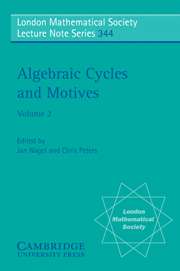Book contents
- Frontmatter
- Contents
- Contents of Volume 1
- Preface
- Volume 2 Research Articles
- 1 Beilinson's Hodge Conjecture with Coefficients
- 2 On the Splitting of the Bloch–Beilinson Filtration
- 3 Künneth Projectors
- 4 The Brill–Noether Curve of a Stable Bundle on a Genus Two Curve
- 5 On Tannaka Duality for Vector Bundles on p-adic Curves
- 6 On Finite-dimensional Motives and Murre's Conjecture
- 7 On the Transcendental Part of the Motive of a Surface
- 8 A Note on Finite Dimensional Motives
- 9 Real Regulators on Milnor Complexes, II
- 10 Motives for Picard Modular Surfaces
- 11 The Regulator Map for Complete Intersections
- 12 Hodge Number Polynomials for Nearby and Vanishing Cohomology
- 13 Direct Image of Logarithmic Complexes
- 14 Mordell–Weil Lattices of Certain Elliptic K3's
6 - On Finite-dimensional Motives and Murre's Conjecture
Published online by Cambridge University Press: 05 April 2013
- Frontmatter
- Contents
- Contents of Volume 1
- Preface
- Volume 2 Research Articles
- 1 Beilinson's Hodge Conjecture with Coefficients
- 2 On the Splitting of the Bloch–Beilinson Filtration
- 3 Künneth Projectors
- 4 The Brill–Noether Curve of a Stable Bundle on a Genus Two Curve
- 5 On Tannaka Duality for Vector Bundles on p-adic Curves
- 6 On Finite-dimensional Motives and Murre's Conjecture
- 7 On the Transcendental Part of the Motive of a Surface
- 8 A Note on Finite Dimensional Motives
- 9 Real Regulators on Milnor Complexes, II
- 10 Motives for Picard Modular Surfaces
- 11 The Regulator Map for Complete Intersections
- 12 Hodge Number Polynomials for Nearby and Vanishing Cohomology
- 13 Direct Image of Logarithmic Complexes
- 14 Mordell–Weil Lattices of Certain Elliptic K3's
Summary
Introduction
The conjectures of Bloch, Beilinson, and Murre predict the existence of a certain functorial filtration on the Chow groups (with ℚ-coefficients) of all smooth projective varieties, whose graded quotients only depend on cycles modulo homological equivalence. This filtration would offer a rather good understanding of these Chow groups, and would allow to prove several other conjectures, like Bloch's conjecture on surfaces of geometric genus 0. In Murre's formulation (cf. 6.5.1 below) one can check the validity of the conjecture for particular smooth projective varieties, and in fact, a slightly weaker form of the conjecture has been proved for several cases, e.g., for surfaces [Mu1] and several threefolds [GM] (proving parts (A), (B) and (D) of the conjecture, and giving evidence for (C)). But to my knowledge, there are few results for higher-dimensional varieties, and the strongest form of Murre's conjecture (including part (C)) is only known for curves, rational surfaces, and, trivially, for Brauer-Severi varieties.
The first aim of this paper is to exhibit some cases, where the full Murre conjecture can be shown. The positive aspect is that we get this for some non-trivial cases of varieties of higher (in fact arbitrarily high) dimension, the negative aspect is that we get this just for some special varieties and special ground fields. In particular, not over some universal domain.
- Type
- Chapter
- Information
- Algebraic Cycles and Motives , pp. 112 - 142Publisher: Cambridge University PressPrint publication year: 2007
- 21
- Cited by

